I hadn't met Judith Rossell when she agreed to do the pictures for my new book, Wrong Way, but as soon as I saw the way she had brought to life the independent little duck at the centre of the story, it was as if we'd been best friends for years. When he's up on his mother's back, lording it over Right Way and Your Way (who always do whatever she says) and doing the exact opposite of what is expected, I can see at once that Jude understands him - and humans like him - perfectly! I feel so lucky and honoured to have her pictures along with my words.
The origins of a story are quite scattered and complex. The title goes back to my delight the first time I saw one of those freeway signs when I was growing up: 'GO BACK: YOU ARE GOING THE WRONG WAY'. Drivers going in the right direction couldn't read these words unless they were well past them and looked back. So I loved the idea that someone had imagined what it would feel like to be a driver and suddenly realise they had gone down the wrong ramp. And the traffic authority had produced a sign that would hardly ever be of any practical use. The idea made me smile. Little did I know that the first time I drove on the 'wrong' side of the road in the United States I would take the wrong ramp on one of those complicated flyovers and the panic would wipe the smile off my face quick smart, and show me just how practical those Australian signs were!
Then years later I was with my three-year-old daughter on a walk to see the summer palace in Denmark. The sky was cloudless and sunny, but the cold was searing and I hadn't taken gloves. (To an Australian unused to punishing winters, gloves seemed a bit of a wussy affectation.) So when the long walk proved beyond my daughter's little legs and she said they were bored and that she wanted to be carried, I had no choice but to take my hands out of the depths of my pockets and carry her. When we got back home, I had no feeling in my hands at all. Hot water, armpits, radiators - nothing would bring them back to life. And when they did revive in their own good time, the ache was unforgettable. 'But didn't you know that a clear sky means the day was going to be colder than ever?' My host couldn't believe that anyone could have been so stupid.
The third memory I have is of the old man who lived beyond our back fence when I was quite young myself. He sat at the table in big baggy khaki shorts and a navy blue singlet. He always ate his dessert first and after that he had the meat and vegetables. He liked dessert the best, he said, so why should he leave it till last? We ate our dinner in the conventional order at our house, but I remember thinking how exciting it was to find a man of his age being so deliberately 'naughty'.
So all these images were playing round in my head when I was thinking about my years as both a teacher and as the parent of young children. The students I tended to remember were the difficult ones who challenged me: the kids for whom school was rarely a good fit and who consequently did things their own way. And when I came to tell stories about my children growing up, they weren't stories about the countless wonderful times when they were delightful company. The stories were about the times when there were things I felt had to be done, but they had other plans. Mem Fox says that 'trouble' is the energy source for all stories really. And she's right - happy, comfortable times are wonderful to luxuriate in, but there's a sameness and an ease about them that makes them quite boring to write about.
So we tell stories about the difficult times, the unexpected situations, the characters who are rebels. They challenge the ways we see the world, and since we're mostly social beings, we try to see whether we can reconcile their ways with our own, so that we can live together. Of course, foolishly, we often try to change them and punish them for not fitting in. But as any parent or teacher knows, in the long run that strategy's bound to fail. We learn and learn to change at our own pace. And that's what Wrong Way is about.
Some adult readers won't like the allegorical names. Well, that's okay. I know families who give each other nicknames like these, and in any case, by introducing them on the first page, the story is offering chidren a playful code. It's just a game, with a few winks and nods, but I hope just enough truth to life to make it worthwhile.
My wonderful editor Ali Lavau/ Frances Watts, who is such a talented writer for young readers herself, wisely suggested I get rid of the original opening line: 'Everyone knows that a mother's life isn't easy.' (But that is partly what the book's about. No doubt it didn't need to be said.) And she suggested I include more refrains, since they would make the story more fun when it was read aloud. My publisher felt there were too many words on one spread and wanted me to drop the lines where Wrong Way scoffs down the fat snail he's been hoarding, and does a short bum dance for the benefit of the other ducklings beneath him. But I loved that scene and said I would really like it to stay. I don't think I've done much triumphal dancing myself in situations like that, but I know siblings will recognise it and I've certainly been on the receiving end of it - unless my telling this story about being an uncooperative author is a little bum dance of my own. Maybe it is.
Thursday, March 25, 2010
Subscribe to:
Post Comments (Atom)

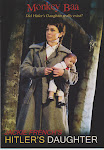
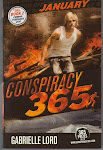
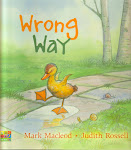
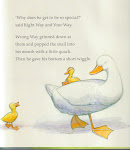
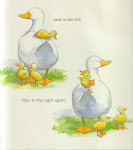

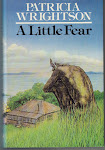

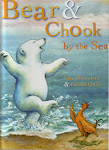

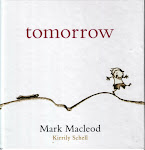
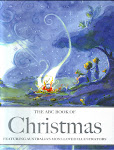

Congrats on the book, Mark. Saw it in Better Read than Dead yesterday and it looks gorgeous! Hope it does really well for you.
ReplyDelete